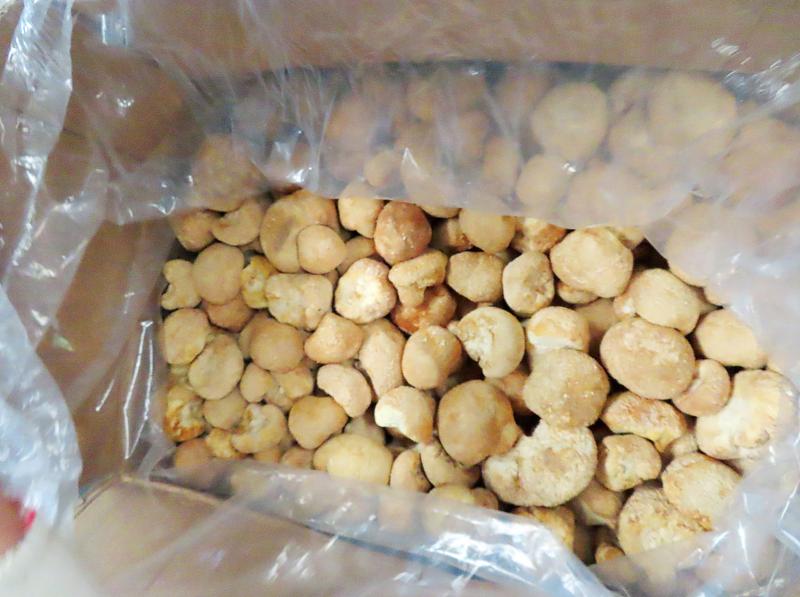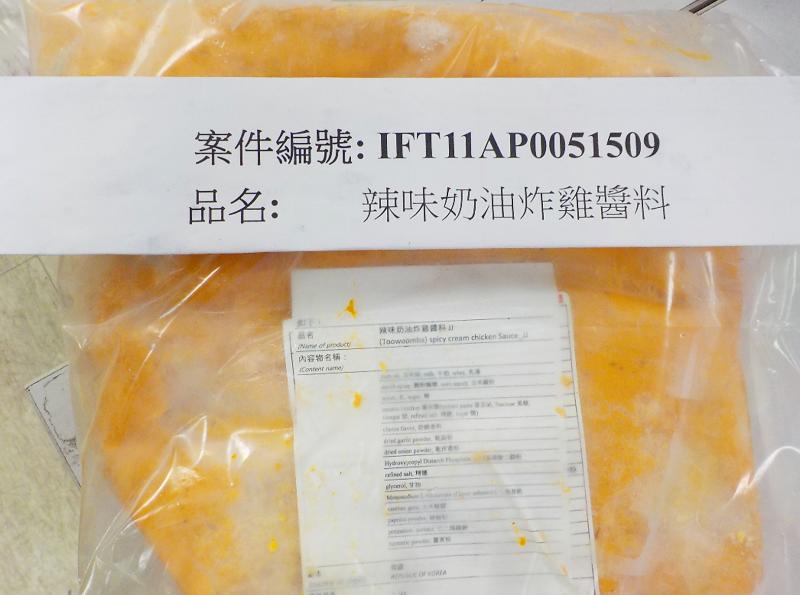Several shipments of fried chicken, rice cake sauce and instant noodles imported from South Korea were seized by customs after being found to contain excessive amounts of preservatives or banned pesticide residue, the Food and Drug Administration (FDA) said yesterday.
The FDA released a list of 16 items of food and containers that had failed customs inspections and were stopped at the border.
The products included a shipment of spicy cream chicken sauce, honey oligosaccaride chicken sauce and rice cake chicken sauce imported from South Korea by Kaohsiung-based TMT Enterprise Co.

Photo courtesy of FDA
All the problematic products were returned to their country of origin or destroyed, the FDA said.
The vinegar and soy sauce in the sauces contained preservatives in amounts exceeding legal limits, FDA Northern Center head Chen Ching-yu (陳慶裕) said.
It was the first time TMT Enterprise has contravened the regulations, Chen said.

Photo courtesy of FDA
In addition, a batch of seafood-flavored instant noodles also from South Korea was rejected due to excessive amounts of the banned pesticide ethylene oxide, the FDA said.
Customs inspectors also found other substandard products, including a shipment of Regent Mochi Ube, a Japanese-style glutinous rice cake, imported from the Philippines which failed to comply with Taiwan’s food preservative regulations, as it contained dehydrated acetic acid, Chen said.
Dehydrated acetic acid is only allowed to be used in cheese, cream and similar products, but cannot be used in biscuits, cookies and cakes, Chen said.
In addition, a shipment of lion’s mane mushroom, or monkey’s head mushroom, from China was also found to contain excessive levels of pesticide residue, Chen said.
It was the 15th time in six months that Chinese lion’s mane mushrooms had failed inspections, Chen said, adding that the FDA began batch-by-batch inspections of the product on May 2.
The agency on Tuesday last week said that it had asked the Chinese supplier to provide a written explanation by Aug. 3 on why excessive pesticide residues were frequently detected in its shipments.

Three batches of banana sauce imported from the Philippines were intercepted at the border after they were found to contain the banned industrial dye Orange G, the Food and Drug Administration (FDA) said yesterday. From today through Sept. 2 next year, all seasoning sauces from the Philippines are to be subject to the FDA’s strictest border inspection, meaning 100 percent testing for illegal dyes before entry is allowed, it said in a statement. Orange G is an industrial coloring agent that is not permitted for food use in Taiwan or internationally, said Cheng Wei-chih (鄭維智), head of the FDA’s Northern Center for

LOOKING NORTH: The base would enhance the military’s awareness of activities in the Bashi Channel, which China Coast Guard ships have been frequenting, an expert said The Philippine Navy on Thursday last week inaugurated a forward operating base in the country’s northern most province of Batanes, which at 185km from Taiwan would be strategically important in a military conflict in the Taiwan Strait. The Philippine Daily Inquirer quoted Northern Luzon Command Commander Lieutenant General Fernyl Buca as saying that the base in Mahatao would bolster the country’s northern defenses and response capabilities. The base is also a response to the “irregular presence this month of armed” of China Coast Guard vessels frequenting the Bashi Channel in the Luzon Strait just south of Taiwan, the paper reported, citing a

A total lunar eclipse, an astronomical event often referred to as a “blood moon,” would be visible to sky watchers in Taiwan starting just before midnight on Sunday night, the Taipei Astronomical Museum said. The phenomenon is also called “blood moon” due to the reddish-orange hue it takes on as the Earth passes directly between the sun and the moon, completely blocking direct sunlight from reaching the lunar surface. The only light is refracted by the Earth’s atmosphere, and its red wavelengths are bent toward the moon, illuminating it in a dramatic crimson light. Describing the event as the most important astronomical phenomenon

UNDER PRESSURE: The report cited numerous events that have happened this year to show increased coercion from China, such as military drills and legal threats The Chinese Communist Party (CCP) aims to reinforce its “one China” principle and the idea that Taiwan belongs to the People’s Republic of China by hosting celebratory events this year for the 80th anniversary of the end of World War II, the “retrocession” of Taiwan and the establishment of the UN, the Mainland Affairs Council (MAC) said in its latest report to the Legislative Yuan. Taking advantage of the significant anniversaries, Chinese officials are attempting to assert China’s sovereignty over Taiwan through interviews with international news media and cross-strait exchange events, the report said. Beijing intends to reinforce its “one China” principle